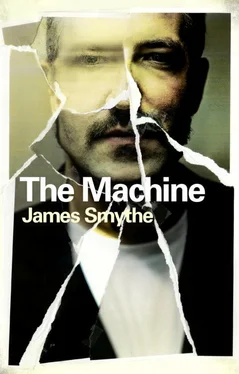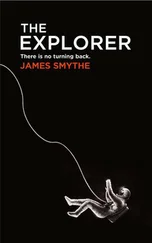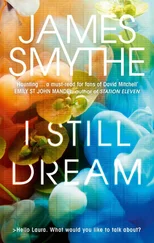I’m not, Beth says.
He’s in there, isn’t he?
Please, Laura, Beth says. Go away. Please just leave me alone.
I can tell. He’s in there. You’ve helped to make a monster, Beth. When he was lost in the first place, that was God’s will. People cry when their loved ones die, but there’s a plan, Beth. He was part of God’s plan. That insistent tone again, and she jams her shoe further inside the doorway, and puts her weight behind the door to keep it open. You should have left him well alone. She backs away from the door. Yours is not to meddle, she says. She makes a sign of the cross.
It was God’s will that he took a bullet? The dreams, the nightmares, the pain: that was all God’s will? Beth feels the bile in her throat: just as when she used to take him to the clinic and they would be there, protesting outside, their heads wrapped in cloths and their arms cradling crucifixes and signs that screamed THE SOUL IS SACRED, telling her to think about what she was doing. And she said, at the time, I am helping my husband: as she led him out after the sessions, drained and weak, ready to sleep it off, and they threw themselves on the ground and begged her to reconsider.
It certainly wasn’t God’s will that he would be rebuilt in an image other than that of our Lord. An image that was created by man. A false prophet. She backs away more. She’s completely different: her eyes crazed. Beth sees her here and doesn’t know how they ever became friends. She tells herself that you don’t know about a person until they show themselves fully. Here, Laura is exposed. Beth shuts the door. She shouts through the wood.
Leave me alone, Laura.
Laura doesn’t leave. She stays standing there, Beth sees, waiting by the railing. She’s sure that Laura is praying.
Beth goes into the bedroom. Vic is asleep on the bed: the Machine is powered up. The noise is still there.
What did you put inside him? she asks. What did you do? She touches the metal: the vibrations run all through her skin, and over her and through her. When you filled in the gaps, what did you fill them with? She sits down. Vic’s asleep, she can tell from the breathing. What did you make him from? She lowers her voice and touches the screen and looks for something that might be an answer. She asks a question, feeling stupid for even considering it: because this isn’t a story or a film or a joke or a song, or anything that isn’t her life. Her actual life. Did you put some of yourself in there? she asks.
The Machine seems to shudder in a way that Beth hates.
The text message wakes Beth up, but Vic sleeps through it. It nags three times to be read, so Beth does, if only to shut it up. She knows that it will be Laura – nobody else messages her, not these days – and she almost dismisses it without looking at it. But she doesn’t, and then she sits on the edge of the bed and reads it again, and again. And she goes to the living room and reads it again, aloud, as if that might, somehow, make it feel more real.
THE BOY WHO DIED. WE BOTH KNOW WHO DID IT.
Beth’s reading it again when another text comes through.
SO HOW CAN YOU LIVE WITH YOURSELF?
Beth sits on the sofa and puts the television on. They have to leave the island now, she knows. There isn’t much time left.
Vic wakes her. She thinks, first thing, that she seems to do nothing but sleep: that this has taken so much out of her that she can hardly stand it. She’s on the sofa, curled up, her whole length pressed tightly between the sofa arms, and her body aches and moans as it unfolds itself.
You’re asleep, he says.
I know. I slept here.
You need to clean your head still, he says. She reaches up and touches the scab, hard and thick, and her hair is caught in it, knotted. She can feel the skin underneath the scab healing, slightly tender. She needs a shower, and she needs to clean the wound, and the hair. We’ll have a scar in the same place, he says. He touches it. He knows exactly how to touch her still. I’m worried about you, he says.
Don’t, Beth says.
I am. I do. He sits on the end of the sofa newly vacated by her feet. I don’t know why I did it. I don’t know. There’s something about him that doesn’t look sad, Beth thinks. As if he’d eaten something that he shouldn’t have, or fucked another woman: a crime that had a payoff. A result. Something done to appease a hunger. I think maybe the Machine could wipe that I did it, he says. Is that a good idea?
No, Beth says. Don’t even think that.
But it won’t do any good, knowing it. And you could wipe it as well. Get it taken away, like it never happened.
It did happen.
Yes. But.
We have to leave, Beth says. Laura knows.
Your friend.
She’s not my friend.
She knows?
Yes. She knows that you’re back. She’s… Beth’s about to say something about the Machine, about what Laura thinks of it, but she catches herself. She doesn’t want to make Vic angry. Or the Machine. But she thinks about that boy, and how Vic saw him as a threat. She doesn’t want the same for Laura. She’s just nosy, Beth says, and she’s insistent, and she won’t leave anything alone.
He smiles. You used to hate that in people.
I still do, Beth tells him. She smiles at him, but it takes effort. He dresses himself, and she watches his body putting itself into his clothes, and she wonders if she could remove his memories of the murder. She couldn’t do it again, no, no chance of her putting him back into the hands of the Machine, because she couldn’t bear to see his face contorted that way again; and that noise from his mouth; and she couldn’t stand the wrenching away, piece by piece – like a finished jigsaw being picked apart, fingernails pushed under the pieces to remove them, watching the picture fall apart.
So we leave, he says to her from the bedroom. Right?
As soon as we can.
How soon is that?
Today. Tomorrow at the latest. We pack what we need, that’s it. Landlord can throw the rest.
What about that, in the other room? He looks at the bedroom wall, as if he can see through it to the Machine. She knows he can hear it, even though she’s never asked him. She just knows.
We disassemble it.
Okay. Vic nods, but Beth’s sure there’s something else there: a twitch. A tic.
She fetches bags from the bedroom, from underneath the bed: two large holdalls, one that used to be his, in their previous life, and one that used to be hers, and she puts them onto the bed and peels them open. She starts with her casual clothes: the stuff she can wear day to day, regardless of where they end up. She had planned for the UK, but there’s a lot to be said for abroad. Heading to France, maybe, where their money might go a bit further; or Spain, if they can cope with the heat there. She thinks about how much she’s been sleeping, and laughs at how easily she could adjust to the siesta lifestyle. Maybe Spain, she tells herself. Get the ferry to France, buy a car, drive down. Get the ferry to Spain itself, if Vic’s up to it. He used to get seasick. She wonders if that – his seasickness – will have made the transition, because it wasn’t mentioned in any of the recordings. Is seasickness part of a person? Or something embedded in a memory?
Vic stands by the front door.
I want to go for a run, he says.
It’s best if you don’t.
Why?
Because of the police.
They won’t ask me who I am.
Just stay here, please, Beth says. She realizes that she sounds desperate: but she doesn’t know why he’s being so casual about this. He sits on the sofa and stares at the wall, as if that is all that he is: he runs, he argues, he occasionally comforts her and apologizes. Why don’t you watch TV? Beth says.
Читать дальше
Конец ознакомительного отрывка
Купить книгу










